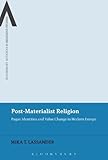Post-Materialist Religion : Pagan Identities and Value Change in Modern Europe.
Material type: TextSeries: Bloomsbury advances in religious studiesPublication details: London : Bloomsbury Publishing, 2014.Description: 1 online resource (224 pages)Content type:
TextSeries: Bloomsbury advances in religious studiesPublication details: London : Bloomsbury Publishing, 2014.Description: 1 online resource (224 pages)Content type: - 9781472514776
- 1472514777
- 9781472511850
- 1472511859
- Secularism -- Europe
- Neopaganism -- Europe
- Nature -- Religious aspects
- Europe -- Religion -- 21st century
- Néopaganisme -- Europe
- Nature -- Aspect religieux
- Sociology & anthropology
- Religion: general
- Aspects of religion (non-Christian)
- RELIGION -- Comparative Religion
- RELIGION -- Essays
- RELIGION -- Reference
- Nature -- Religious aspects
- Neopaganism
- Religion
- Secularism
- Europe
- 2000-2099
- 200.94
- BL695
- online - EBSCO
| Item type | Current library | Call number | URL | Status | Notes | Barcode | |
|---|---|---|---|---|---|---|---|
 eBook
eBook
|
Biblioteca "Angelicum" Pont. Univ. S.Tommaso d'Aquino Nuvola online | online - EBSCO (Browse shelf(Opens below)) | Online access | Not for loan (Accesso limitato) | Accesso per gli utenti autorizzati / Access for authorized users | (ebsco)813750 |
Print version record.
FC; Half Title; Title Page; Copyright; Dedication; Contents; List of Illustrations; List of Tables; Acknowledgements; Preface; 1. Introduction ; Entity models of the decline and change of religion; Critique of the entity model; Moral intuition and universals in human values; A new focus -- vernacular religion and the non-entity model; Towards a post-materialist religion; The socio-cultural contexts of this study; Contemporary Paganism; 2. Pragmatism and the study of religions; Pragmatic turns; The struggle for knowledge and good-enough objectivity; Pragmatism in the study of religions.
Research objective and the methods usedMeasuring post-materialist values; Fieldwork procedures; 3. Religious identity and values ; Data from the European Social Survey; Validating the theoretical value model; Covariates; Results; A religion that is relevant for the young generations; 4. Modes of interpersonal relations ; Testing the Individualism-Collectivism model; Exploring subgroups within the samples; Linking the modes of interpersonal relations to values; Heterogeneous and egalitarian context breeds tolerance; 5. Pagans out of the woodwork ; The character of the quasi-object.
The changing narrative of the worldFinding a form for Paganism; an exercise in cat-herding; Paganism is work, with the goal of personal growth; 6. Restyling religion: From templates to trellises ; Complexity; Two habits of religion; A revised model of religious change; 7. Conclusion ; Security, tradition, conformity -- and bigotry?; Self-expression: Selfish egoism or universalistic individualism?; Concluding remarks; Notes; References; Index.
Post Materialist Religion discusses the transformations ofthe individual's worldview, and the role religion and nature can play incontemporary European societies. In doing so, Mika Lassander brings intoconversation sociological theories of secularisation and social-psychologicaltheories of interpersonal relations, the development of morality, and thenature of basic human values. European societies are marked by an ethos of secularism, whereby overt display of religiosity is generally considered objectionable orat least unusual, with the exception of special occasions or festivals. PostMateriali.
Includes bibliographical references (pages 177-195) and index.


